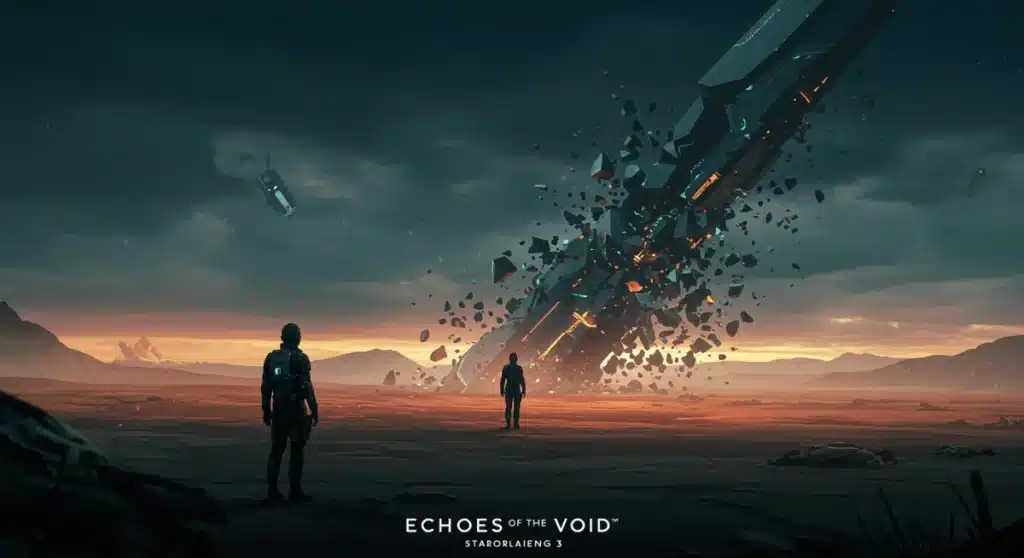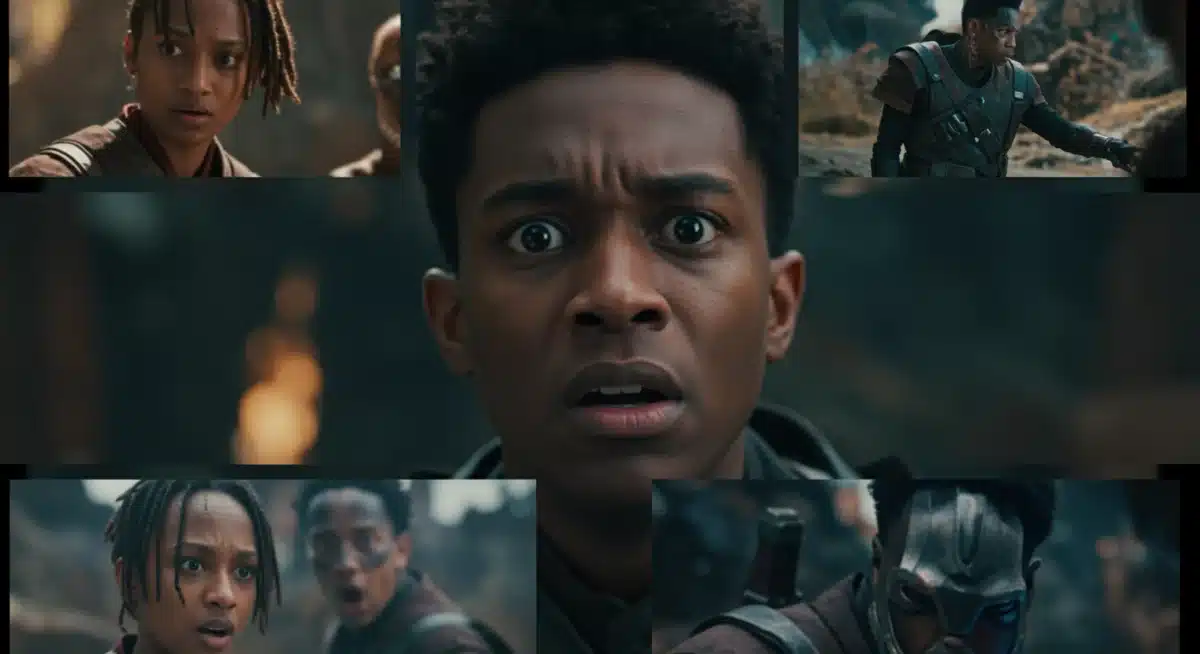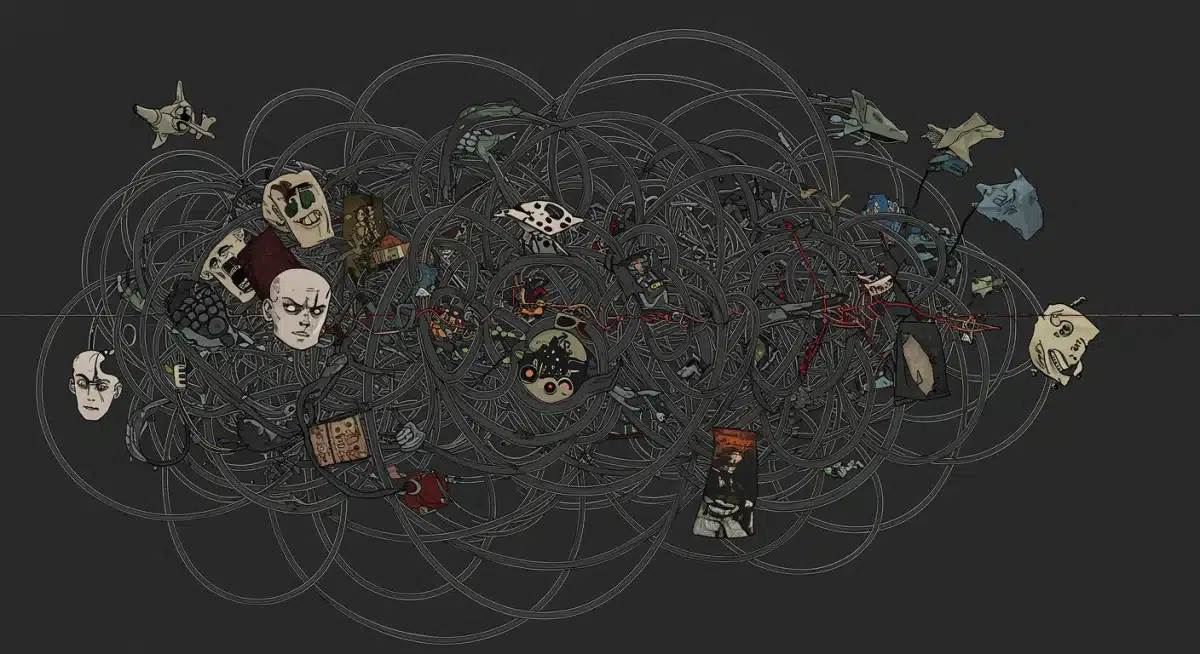Critical Analysis: Storytelling Flaws in ‘Echoes of the Void’ S3

When a beloved series returns for a new season, expectations soar. Fans eagerly anticipate the continuation of compelling narratives, the evolution of cherished characters, and the expansion of intricate worlds. However, sometimes these expectations are met with disappointment. This article offers a Critical Analysis: The Storytelling Flaws in the Latest Season of ‘Echoes of the Void’ (Season 3 Review), delving into the specific narrative missteps that hindered what could have been a truly remarkable continuation of the saga. Episodenew, as your guide to the streaming universe, aims to provide an honest, in-depth look at what went wrong, helping you understand why this season fell short for many viewers.
The Unraveling of a Promising Premise
The initial seasons of ‘Echoes of the Void’ captivated audiences with their innovative premise, intricate world-building, and a compelling cast of characters. The series promised a deep dive into existential questions, advanced technology, and the ethical dilemmas that arise when humanity pushes the boundaries of the unknown. Season 3, however, seemed to lose its footing, struggling to maintain the narrative coherence and thematic depth that defined its predecessors. The season began with several intriguing new plot threads, but many of these were either underdeveloped or abandoned entirely, leaving viewers with more questions than answers.
One of the primary issues was the departure from the established tone. The previous seasons balanced high-stakes drama with moments of profound introspection and philosophical debate. Season 3, in contrast, often veered into overly convoluted action sequences that lacked emotional resonance, overshadowing the character-driven storytelling that fans had come to appreciate. This shift alienated a segment of the audience who were drawn to the series for its intellectual depth, rather than its spectacle.
Key Narrative Shifts in Season 3
- Shift in Pacing: An abrupt acceleration of plot points, often at the expense of character development.
- Over-reliance on Tropes: Introduction of generic sci-fi tropes that felt unoriginal and out of place within the ‘Echoes of the Void’ universe.
- Lack of Thematic Cohesion: Disjointed themes that failed to connect with the overarching narrative of the series.
- Underutilization of Established Lore: New elements were introduced without fully exploring or integrating the rich lore already built in prior seasons.
Ultimately, the season struggled to reconcile its ambition with its execution, resulting in a narrative that felt both rushed and superficial. The early promise of the season’s premise slowly unraveled, leaving a sense of missed opportunity.
Inconsistent Character Arcs and Motivations
A strong narrative relies heavily on consistent and believable character development. In this Critical Analysis: The Storytelling Flaws in the Latest Season of ‘Echoes of the Void’ (Season 3 Review), it became clear that Season 3 suffered significantly from inconsistent character arcs. Beloved characters made choices that seemed to contradict their established personalities and motivations from previous seasons, leading to confusion and frustration among viewers. Character development felt less like organic growth and more like a series of convenient plot devices designed to move the story forward, regardless of internal logic.
For example, a character known for their unwavering moral compass suddenly engaged in morally ambiguous actions without sufficient build-up or explanation. This abrupt shift undermined their credibility and made it difficult for the audience to empathize or connect with their struggles. Other characters, who had shown immense potential for growth, found themselves relegated to static roles, their personal journeys stagnating in favor of broader, less engaging plotlines. The emotional core of the series, which had always been its characters, began to erode.

Character Development Hurdles
- Unjustified Personality Shifts: Characters acting in ways that contradicted their established traits without proper justification.
- Stagnant Growth: Key characters failing to evolve or learn from their experiences, remaining in a narrative holding pattern.
- Plot-Driven Motivations: Character actions dictated by plot requirements rather than internal consistency or believable motivations.
- Lack of Emotional Depth: Important emotional moments feeling unearned due to insufficient character development leading up to them.
The lack of consistent character arcs made it challenging for viewers to remain invested in the personal stakes of the story. When characters behave unpredictably or illogically, the narrative loses its grounding and the emotional impact diminishes considerably.
Pacing Problems and Disjointed Plotlines
Pacing is a crucial element in storytelling, dictating how quickly or slowly a narrative unfolds and how information is revealed. Season 3 of ‘Echoes of the Void’ struggled significantly with its pacing, exhibiting a disjointed structure that often felt both rushed and drawn-out simultaneously. This uneven rhythm contributed heavily to the Echoes Void Storytelling Flaws observed by many critics and fans alike. Some plotlines were introduced and resolved with breakneck speed, leaving little room for exploration or emotional impact, while others dragged on, becoming tedious and losing viewer interest.
The season frequently jumped between multiple storylines without allowing any single one to fully breathe. This made it difficult for the audience to invest in any particular arc, as their attention was constantly being pulled in different directions. Crucial exposition was sometimes delivered in a hurried manner, while less important subplots were given excessive screen time. This imbalance created a sense of narrative chaos, making it challenging to follow the overarching story and appreciate its nuances.
Common Pacing Issues
- Abrupt Transitions: Sudden shifts between scenes and plotlines without smooth segues.
- Rushed Resolutions: Important conflicts or mysteries being resolved too quickly, diminishing their impact.
- Bloated Subplots: Secondary storylines consuming too much screen time, detracting from the main narrative.
- Uneven Information Flow: Key revelations being either withheld too long or disclosed too rapidly, disrupting the narrative flow.
Ultimately, the erratic pacing and disjointed plotlines prevented Season 3 from achieving a cohesive and engaging narrative experience. The story felt less like a carefully crafted tapestry and more like a collection of loosely connected threads.
Underdeveloped World-Building and Lore
A hallmark of ‘Echoes of the Void’ in its early seasons was its rich and meticulously crafted world-building. The series introduced fascinating alien cultures, complex technological advancements, and a deep, compelling history that expanded the universe with each episode. However, our Critical Analysis: The Storytelling Flaws in the Latest Season of ‘Echoes of the Void’ (Season 3 Review) reveals a significant decline in this aspect. Season 3 largely neglected to build upon the established lore, and in some cases, even introduced elements that contradicted previously established facts without adequate explanation.
Instead of deepening our understanding of the ‘Echoes of the Void’ universe, the season often felt confined to a smaller scope, failing to expand the grand narrative that fans had come to expect. New species or factions were introduced but quickly sidelined, their potential for adding depth to the world left untapped. This lack of attention to world-building made the universe feel smaller and less vibrant, losing some of its initial allure. The sense of wonder and discovery, so prevalent in earlier seasons, was largely absent.

World-Building Deficiencies
- Lack of Expansion: Failure to introduce new, compelling aspects of the universe or deepen existing ones.
- Contradictory Lore: Introduction of new information that clashes with previously established facts without justification.
- Missed Opportunities: New elements or characters introduced but not fully integrated into the world’s fabric.
- Reduced Scope: The narrative feeling smaller and more insular, despite the vastness of the ‘Echoes of the Void’ universe.
The failure to adequately develop its world and lore left a gaping hole in the narrative, preventing the season from achieving the immersive experience that characterized its predecessors.
Reliance on Deus Ex Machina and Convenient Solutions
One of the most frustrating Echoes Void Storytelling Flaws in Season 3 was the frequent reliance on Deus Ex Machina and overly convenient solutions to complex problems. A well-crafted story builds tension and allows characters to overcome obstacles through their own ingenuity, sacrifice, or growth. However, Season 3 often introduced sudden, unexplained plot devices or new abilities that magically resolved seemingly insurmountable challenges, undermining the stakes and the character’s agency.
These convenient solutions often felt unearned and unsatisfying, diminishing the impact of critical moments. When characters are consistently rescued by external forces or sudden, unexplained powers, the audience loses interest in their struggles because the outcomes feel predetermined rather than hard-won. This also made it difficult to believe in the severity of the threats presented, as there always seemed to be an easy way out just around the corner, negating any sense of real danger or consequence.
Signs of Convenient Plotting
- Sudden Power-Ups: Characters gaining new, unexplained abilities precisely when needed to resolve a crisis.
- Unforeseen Alliances: Unexpected allies appearing at critical junctures without prior setup.
- Information Dumps: Crucial information being revealed just in time to save the day, often from previously unseen sources.
- Miraculous Escapes: Characters escaping impossible situations through highly improbable coincidences.
The overuse of Deus Ex Machina diminished the narrative’s credibility and the audience’s investment, turning what should have been tense moments into predictable resolutions.
Unsatisfying Resolutions and Unanswered Questions
A compelling season of television typically provides a sense of closure, even if it leaves room for future stories. However, our Critical Analysis: The Storytelling Flaws in the Latest Season of ‘Echoes of the Void’ (Season 3 Review) points to a significant issue: Season 3 left an abundance of critical plotlines unresolved and introduced new questions without providing satisfying answers. This created a feeling of narrative incompleteness, frustrating viewers who had invested hours into the series.
Many major conflicts that were built up throughout the season either received rushed, ambiguous endings or were simply forgotten, leaving crucial character arcs hanging. This approach can be effective if done intentionally for a future season, but in Season 3, it felt more like a consequence of poor planning and execution. The lack of resolution extended to character relationships, overarching mysteries, and even the fate of certain key elements of the ‘Echoes of the Void’ universe, leaving a sense of dissatisfaction rather than anticipation.
Common Issues with Resolutions
- Ambiguous Endings: Major conflicts concluding without clear outcomes or consequences.
- Unaddressed Subplots: Important secondary storylines being left incomplete or abandoned.
- New Unexplained Mysteries: Introduction of new enigmas without any attempt at resolution within the season.
- Lack of Character Closure: Key characters’ journeys ending abruptly or without a definitive conclusion.
The cumulative effect of these unsatisfying resolutions and unanswered questions was a season that felt less like a complete story and more like a fragmented prelude to something that may or may not ever arrive, leaving fans feeling unfulfilled.
| Aspect | Season 3 Flaw |
|---|---|
| Narrative Coherence | Disjointed plotlines & tonal shifts |
| Character Development | Inconsistent arcs & stagnant growth |
| Pacing | Erratic, rushed, and drawn-out moments |
| World-Building | Underdeveloped lore & contradictions |
FAQ
Why are storytelling flaws so critical for a series like ‘Echoes of the Void’?▼
Storytelling flaws are critical because they undermine audience investment and the series’ core appeal. ‘Echoes of the Void’ is known for its intricate narrative and character depth, so any deviation from quality storytelling directly impacts viewer engagement and overall satisfaction, making the experience less immersive.
Did Season 3 introduce new characters effectively?▼
While Season 3 introduced several new characters, their integration was often superficial. Many were either quickly sidelined or served as plot devices rather than fully developed individuals, failing to add substantial depth to the narrative or world of ‘Echoes of the Void’.
How did the pacing issues impact the overall viewer experience?▼
The erratic pacing in Season 3 created a disjointed viewer experience. Rushed resolutions left critical moments feeling unearned, while drawn-out subplots led to boredom. This inconsistent rhythm made it challenging for audiences to maintain investment in the narrative of ‘Echoes of the Void’.
Were there any positive aspects of Season 3’s storytelling?▼
Despite the significant flaws, Season 3 did offer some intriguing conceptual ideas and strong individual performances. Certain visual effects and isolated scenes demonstrated the series’ potential, but these moments were often overshadowed by the broader narrative inconsistencies and structural problems.
What could have improved Season 3’s narrative?▼
Improving Season 3’s narrative would have required a clearer overarching vision, more consistent character development, and a balanced pacing. Focusing on resolving established plotlines while organically expanding the lore, instead of introducing new, underdeveloped elements, would have significantly enhanced the season.
Conclusion
The Critical Analysis: The Storytelling Flaws in the Latest Season of ‘Echoes of the Void’ (Season 3 Review) reveals a season that, despite its initial promise, ultimately struggled to maintain the high standards set by its predecessors. From inconsistent character arcs and disjointed pacing to underdeveloped world-building and an over-reliance on convenient solutions, Season 3 presented numerous narrative missteps. While individual moments of brilliance occasionally shone through, they were often overshadowed by a broader sense of narrative confusion and unfulfilled potential. For fans of ‘Echoes of the Void’, Season 3 serves as a cautionary tale of how even a beloved series can lose its way when storytelling fundamentals are neglected. Episodenew hopes this detailed review helps illuminate the challenges faced by the season and provides context for its reception among the series’ dedicated fanbase.